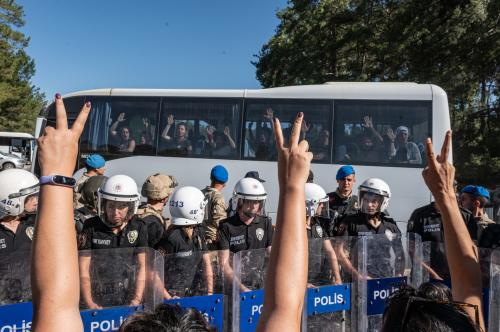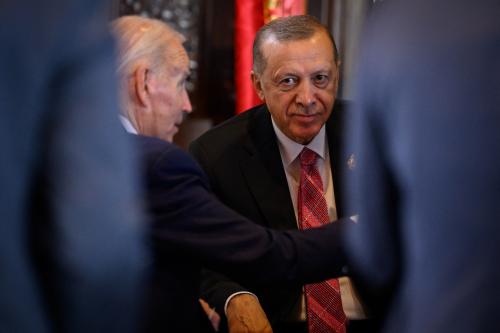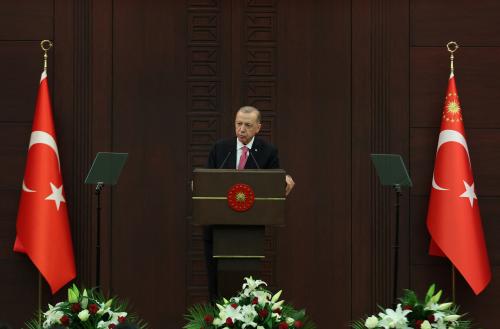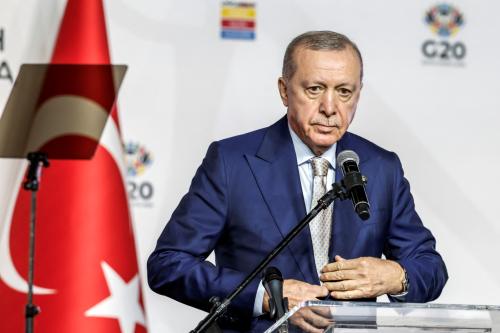The centenary celebrations of the founding of the Turkish republic last month betrayed an unending contestation between two visions of Turkey: one based on the founding values of the republic that emphasizes the secularism intimately associated with the legacy of Mustafa Kemal Atatürk, and a religiously conservative authoritarian one represented by the current president, Recep Tayyip Erdoğan.
Many in the public, including the diplomatic corps in Ankara, were left wondering whether there would be any celebrations at all. This concern was accentuated by Erdoğan’s decision to hold a massive rally in support of Palestinians in Gaza the day before.
In the end, Erdoğan did commence the day in line with established practice by visiting the mausoleum of Atatürk, the founder of the republic, and holding a traditional evening reception. These were followed by an impressive naval parade and an airshow as well as a light and sound display on the Bosphorus in Istanbul. An exhibition highlighting Erdoğan’s more than two-decade-long reign was also unveiled and a one-day vacation for schools was declared following an impromptu announcement.
The legacy of Atatürk’s secular republic
The symbolism embedded in these events was interpreted by many as an attempt to overshadow the legacy of Atatürk’s secular republic with a new Turkey seeped in its Ottoman past and led by Erdoğan. Yet, the many spontaneous celebrations across the country and poll results show a significant degree of attachment to the republic’s original values.
These values originated after the end of World War I when the Ottoman Empire was defeated, and large swaths of today’s Turkey came under Allied occupation. It was Atatürk, then known as Mustafa Kemal Pasha, an Ottoman officer, who led a liberation war against the occupiers and oversaw the birth of the Turkish republic 100 years ago on October 29, 1923.
Subsequently, Atatürk and his colleagues led a major reform process that emphasized secularism in law, modernized education with an emphasis on scientific knowledge, granted women equal rights, embarked on major economic developmental projects, and adopted a foreign policy characterized by Western vocation and the motto “peace at home, peace in the world.” This motto kept Turkey out of World War II and underpinned the development of a policy of non-interference in neighboring countries’ domestic affairs.
Kemalism’s resiliency
The practice of these values came to be referred to as Kemalism. In the ensuing decades, it became associated with a governance record that emphasized the role of the military and stunted Turkey’s democratic development. A narrowly defined secularism, often referred to as laïcité, and a tightly defined national identity around Turkishness culminated in discrimination toward the religiously conservative parts of Turkish society and the Kurdish minority. This led to increasing calls for post-Kemalist policies to remedy these failures and overcome the deep cultural and political divisions in Turkish society.
In his early years in power, Erdoğan and his Justice and Development Party (AKP) adopted policies that seemed destined to improve Turkey’s democracy and heal its divisions. Instead, Erdoğan’s rule during the last decade delivered an authoritarian, religiously conservative regime that has left Turkish society divided, with roughly half of Turks feeling deeply concerned about threats to their secular way of life, women’s empowerment, science-driven education, and Turkey’s Western vocation. However, the contested nature of Turkey’s centenary celebrations suggests that though Erdoğan may be at the pinnacle of his power, he is far from eclipsing Atatürk’s legacy.
The “Great Palestine Meeting” in Istanbul
In the leadup to the anniversary, Erdoğan called for a “Great Palestine Meeting” and declared that Hamas was not a terrorist organization but a “group of liberation and mujahedeen fighting to defend its lands and citizens.” This stood in stark contrast to the moderate stance that he initially struck following the outbreak of the Israel-Hamas conflict on October 7.
Erdoğan and the AKP have their roots in the National Outlook Movement, with strong ideological and organizational connections to the Muslim Brotherhood (MB), which includes Hamas. These ties became especially conspicuous after the Arab Spring erupted and Erdoğan openly supported the MB in Egypt, Libya, and Syria.
These links caused Turkey’s relations with Saudi Arabia, the United Arab Emirates, and especially Egypt — where Mohamed Morsi, a democratically-elected president and leader of the MB, was deposed in a military coup — to deteriorate. More dramatically, Erdoğan embroiled Turkey in Syria and Libya’s civil wars in pursuit of a pan-Islamist agenda.
However, more recently, the need to end Turkey’s regional isolation and pragmatic economic considerations culminated in an effort to repair relations with Gulf governments as well as Egypt and Israel. This U-turn returned Turkish foreign policy in the Middle East to its traditional roots by emphasizing non-interference in Arab affairs and a more balanced approach to the Israeli-Palestinian conflict. Yet the rally in late October and Erdoğan’s narrative served as a reminder of the persistence of domestic political considerations and his anti-Western, pan-Islamist agenda.
Turkey’s centenary naval parade
On the day of the centenary, the Bosphorus witnessed the largest naval parade in Turkish republican history, featuring 100 vessels including the flagship of the Turkish Navy, the homebuilt TCG Anadolu. Erdoğan chose to salute these vessels from the Vahdettin Pavilion, named after the last Ottoman monarch, Mehmed VI, rather than Dolmabahçe Palace which is on the European side of the Bosphorus and is closely associated with Atatürk’s legacy. The symbolism did not go unnoticed.
Mehmed had fled Istanbul on a British warship after the Turkish nationalist forces in Ankara abolished the sultanate in November 1922. These critical events broke Turkey from its Ottoman past and inaugurated its new beginning as a republic in 1923. Erdoğan’s evocative choice suggests an attempt to rehabilitate the legacy of Ottoman rule and reveals a discomfort toward what the republic represents.
The naval parade served a second purpose: reinforcing Erdoğan’s narrative that Turkey is a global power with impact on the course of international affairs thanks to his economic, infrastructure, and defense projects — all amply displayed in an exhibition. The parade also challenged the United States’ pro-Israel stance on the crisis in Gaza and follows Erdoğan’s denunciation of the U.S. decision to send an aircraft carrier strike group to the Eastern Mediterranean.
Lastly, when coupled with Erdoğan’s barrage of criticism over the West’s reluctance to rein in Israel and stop the destruction in Gaza, there is also a thinly disguised questioning of the wisdom of the Turkish republic’s traditional Western vocation. This vocation is characteristic of a secular Turkey, contrary to Erdoğan’s Islamic and Ottoman orientation which calls for strategic independence from the West.
An impromptu day off for schools
On October 29, Erdoğan published an impromptu tweet on X, formerly known as Twitter, announcing a day off for schools. The decision appears to have been made unilaterally, without any consultations involving relevant stakeholders, including the minister of education. Perhaps a worthy populist investment to win the hearts of future voters, it reflects how Erdoğan’s one-man rule is steeped in arbitrariness and disregard for institutions.
The decision also manifests Erdoğan’s long-standing wish to transform Turkey’s national education system into one focused on the raising of “pious generations.” This has resulted in a marked increase in the number of Imam Hatip schools that initially were tasked with training personnel for the country’s mosques. The reforms also targeted curriculum: In a striking departure from established practice, Darwin’s theory of evolution was removed from the national education curriculum and replaced with religious teachings about the origins of humans.
Over the last century, the Ottoman education system, mostly centered on religious teachings, was modernized with a new emphasis on scientific knowledge and an inquisitive mind. This transformation was widely credited as one of the Turkish republic’s most significant achievements and is still viewed as a vital tool for national and personal advancement, especially for women.
In his centenary address to pupils and parents, a middle-school teacher revealingly expressed that the republic’s legacy is best represented by the “little girl in class who raises her hand and asks questions.” Moreover, this approach to education promoted meritocracy, contrary to Erdoğan’s preference for loyalty.
Erdoğan, Turkey’s centenary, and a divided society
It is expected that Erdoğan was uninterested in a centenary program that would have emphasized the republic’s legacy and values. Instead, the public took matters into its own hands, with many companies, municipalities, neighborhoods, and private groups holding their own celebrations.
Yet despite Erdoğan’s polarizing policies, Turks appear fairly united on Atatürk and the republic’s legacies. A recent Metropoll survey from October reveals strong support: 86% of respondents expressed gratitude to Atatürk, including 82% of AKP supporters. Equality between man and woman, core to the republic’s legacy and increasingly contested by Erdoğan, is supported by 80% of respondents in general and 74% of AKP voters. These results and the spontaneous centenary celebrations indicate that the Turkish public at large has a strong affinity for republican values, regardless of its political divisions.
As a former U.S. ambassador to Turkey has rightly observed, Turkey’s republican performance over the last century is checkered with respect to minority rights, democratic governance, and Islam. However, he also recognizes Turkey can only overcome these challenges by implementing the ideals of the republic as defined a century ago. Erdoğan is well-placed to do this but the kind of centenary celebration he chose implies that the republic’s fundamental values continue to perturb him. Contestation over Turkey’s future is likely to continue well into the country’s second century.
The Brookings Institution is committed to quality, independence, and impact.
We are supported by a diverse array of funders. In line with our values and policies, each Brookings publication represents the sole views of its author(s).








Commentary
Erdoğan’s discomfort with Turkey’s first centenary
November 17, 2023